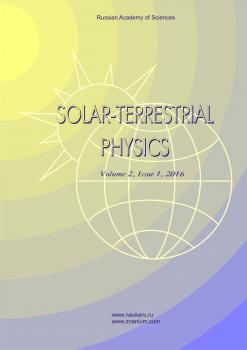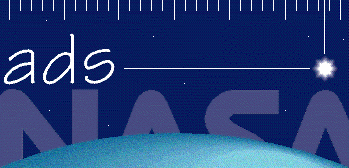Moscow, Russian Federation
This article addresses methodical issues concerning the modeling of the Dst variation in a geomagnetic storm. We describe the so-called RBM (Russell — Burton — McPherron) model representing an ordinary differential equation with solutions simulating the relation between the Dst variation and the azimuthal component of the interplanetary electric field. Special attention is paid to the threshold nature of Dst variation excitation. We would like to emphasize the necessity of stochastic extension of the RBM model by taking into account fluctuations inherent to any physical system. The integral representation of a Dst variation bifurcation diagram is given. It enables us to account for the effect of fluctuations that eliminate the diagram root singularity and cause a threshold point shift. The Dst variation is shown to be typical of the wide class of threshold phenomena similar to second-order phase transitions. We draw an analogy with threshold phenomena in Earth’s magnetosphere, atmosphere, and lithosphere. In addition, we briefly discuss the issue about soft and hard passages through the threshold, as well as about explosive instability in geophysical media.
Magnetosphere, phase transition, bifurcation, fluctuations, explosive instability, atmosphere, lithosphere
1. Burton R.K., McPherron R.L., Russell C.T. An empirical relationship between interplanetary conditions and Dst J. Geophys. Res. 1975, vol. 80, no 31, pp. 4204-4214.
2. Collins R.E. Flow of fluids through porous materials. New York, Reinhold Publishing Co., 1961, 270 p. (in English). (Russian edition: Kollinz R. Techeniya zhidkostei cherez poristye materialy. Moscow, Mir Publ., 1964, 352 p.).
3. Dungey J.W. Cosmic Electrodynamics. Cambridge, Cambr. Univ. Press, 1958, 183 p. (In English). (Russian edition: Danzhi Dzh. Kosmicheskaya elektrodinamika [Cosmic Electrodynamics]. Moscow, Gosatomizdat Publ., 1961, 208 p.).
4. Fisher R.A. The wave of advance of advantageous genes. Annual Eugenics. 1937, vol. 7, pp. 355-369.
5. Gilmore R. Catastrophe Theory for Scientists and Engineers. New York, Wiley, 1981, 666 р. (Russian edition: Gilmor R. Prikladnaya teoriya katastrof [Applied Catastrophe Theory]. Moscow, Mir Publ., 1984, 350 p.)
6. Goldstein M.L. Major unsolved problems in space plasma physics. Astrophys. and Space Sci. 2001, vol. 277, no. 1/2, pp. 349-369.
7. Gradshteyn I.S., Ryzhik I.M. Tablitsy integralov, summ, ryadov i proizvedenii. [Tables of Integrals, Sums, Series, and Products]. Moscow, Fizmatgiz Publ., 1962, 1100 p. (In Russian). (English edition: Gradshteyn I.S., Ryzhik I.M. Tables of Integrals, Sums, Series, and Products. Academic Press, Elsevier Inc., 2007, 1171 p.).
8. Guglielmi A.V., Klain B.I., Rusakov N.N. Geoelectric field from observation at drift station North Pole - 22. Geo-fizicheskii sbornik AN UkSSR [Collected Papers on Geophysics of AS UkSSR].1979, iss. 88, pp. 60-64. (In Russian).
9. Guglielmi A.V. Problems in phenomenological modeling of Dst variation. Geomagnetizm i aeronomiya [Geomagnetism and Aeronomy]. 1988, vol. 28, no. 2, pp. 272-276. (In Russian).
10. Guglielmi A.V., Poyushkina T.N., Potapov A.S. Search for optimal source shape in RBM model of Dst variation. Issledovaniya po geomagnetizmu, aeronomii i fizike Solntsa [Studies in Geomagnetism, Aeronomy and Solar Physics]. 1989, iss. 85, pp. 95-100. (In Russian).
11. Guglielmi A.V., Pokhotelov O.A. Geoelectromagnetic Waves. Bristol and Philadelphia, IOP Publ. Ltd., 1996, 402 p.
12. Guglielmi A.V. On threshold phenomena in geoelectrics. Fizika Zemli [Physics of the Earth]. 2002, no. 4, pp. 75-77. (in Russian).
13. Horsthemke W., Lefever R. Noise-Induced Transitions. Berlin, Springer, 1984, 299 p.
14. Kangas J., Guglielmi A., Pokhotelov O. Morphology and physics of short-period magnetic pulsations (A Review). Space Sci. Rev. 1998, vol. 83, pp. 435-512.
15. Kolmogorov A.N., Petrovsky N.G., Piskunov N.S. Studying the equation of diffusion combined with amount of a substance increase, and its application to one biological problem. Byulleten’ MGU. Ser. A: Matematika i mekhanika [Bull. MSU. Ser. A: Mathematics and Mechanics]. 1937, vol. 1, no. 6, pp. 1-16. (In Russian).
16. Landau L.D., Lifshits E.M. Statisticheskaya fizika [Statistical physics]. Part 1. Moscow, Fizmatlit Publ., 2005, 616 p. (In Russian). (English edition: Landau L.D., Lifshitz E.M. Statistical Physics. Part 1. Oxford, Butterworth-Heinemann, 1980, 564 p.).
17. Migdal A. B. Kachestvennye metody v kvantovoi teorii polya [Qualitative Methods in Quantum Field Theory]. Moscow, Nauka Publ., 1975, 336 p. (In Russian). (English edition: Migdal A. B. Qualitative Methods in Quantum Theory. Addison-Wesley Publ., 1977, 437 p.)
18. Nishida A. Geomagnetic Diagnosis of the Magnetosphere. Springer-Verlag, 1978, 256 p. (Physics and Chemistry in Space, Book 9). (In English). (Russian edition: Nishida A. Geomagnitnyi diagnoz magnitosfery [Geomagnetic Diagnosis of the Magnetosphere]. Moscow, Nauka Publ., 1980, 299 p.).
19. Omori F. On after-shocks. Rep. Imp. Earthq. Inv. Corn. 1894, vol. 2, pp. 103-138.
20. Russell C.T., Hoppe M.M. Upstream waves and particles. Space Sci. Rev. 1983, vol. 34, no. 2, pp. 155-172.

















